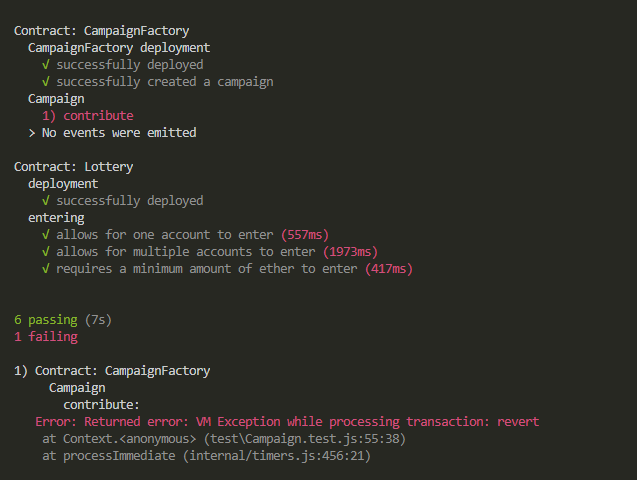Here is my smart contract source code.
// SPDX-License-Identifier: UNLICENSED
pragma solidity ^0.8.9;
contract CampaignFactory {
address[] public deployedCampaigns;
function createCampaign(uint minimum) public {
Campaign newCompaign = new Campaign(minimum, msg.sender);
deployedCampaigns.push(address(newCompaign));
}
function getDeployedCampaigns() public view returns(address[] memory){
return deployedCampaigns;
}
}
contract Campaign {
struct Request {
string description;
uint amount;
address recipient;
bool complete;
uint approvalCount;
mapping (address => bool) approvals;
}
mapping(address => bool) approvers;
uint approversCount;
Request[] requests;
address public manager;
uint public minimumContribution;
modifier restricted() {
require(msg.sender == manager);
_;
}
constructor(uint minimum, address creator) {
manager = creator;
minimumContribution = minimum;
}
function contribute() public payable {
require(msg.value > minimumContribution);
approvers[msg.sender] = true;
approversCount++;
}
function createRequest(string memory description, uint amount, address recipient) public
restricted{
Request storage newRequest = requests.push();
newRequest.description = description;
newRequest.amount = amount;
newRequest.recipient = recipient;
newRequest.complete = false;
newRequest.approvalCount = 0;
}
...
}
Truffle javascript test code :
const {assert} = require('chai');
const Web3 = require('web3');
const ganache = require('ganache-cli');
const web3 = new Web3(ganache.provider());
const CampaignFactory = artifacts.require('./CampaignFactory');
const Campaign = artifacts.require('./Campaign');
contract('CampaignFactory', (accounts) => {
let factory;
let campaign;
let campaignAddress;
before( async () => {
factory = await CampaignFactory.deployed();
// We create a campaign instance but not get a reference to the campaign instance.
// Remember that anytime we send a transaction we get absolutely no result back except for
// a transaction receipt
const childContractTx = await factory.createCampaign(web3.utils.toWei('0.02', 'ether'));
campaignAddress = childContractTx.receipt.to;
campaign = await Campaign.at(campaignAddress);
})
describe('CampaignFactory deployment', async () =>{
it('successfully deployed', async () => {
const address = await factory.address
assert.notEqual(address, '')
assert.notEqual(address, null)
assert.notEqual(address, undefined)
assert.notEqual(address, 0x0)
})
it('successfully created a campaign', async ()=> {
const address = await campaign.address;
assert.notEqual(address, '')
assert.notEqual(address, null)
assert.notEqual(address, undefined)
assert.notEqual(address, 0x0)
})
})
describe('Campaign', async ()=> {
it('contribute', async ()=> {
const manager = await campaign.manager();
console.log("manager", manager)
assert.equal(accounts[0], manager);
})
})
}
The below is the result of test :

The "Campaign" instance was created and deployed by CampaignFactory. "manager" is a public state variable of "Campaign" smart contract. So I tried to read it through its default getter. But it was failed. What's wrong with me?